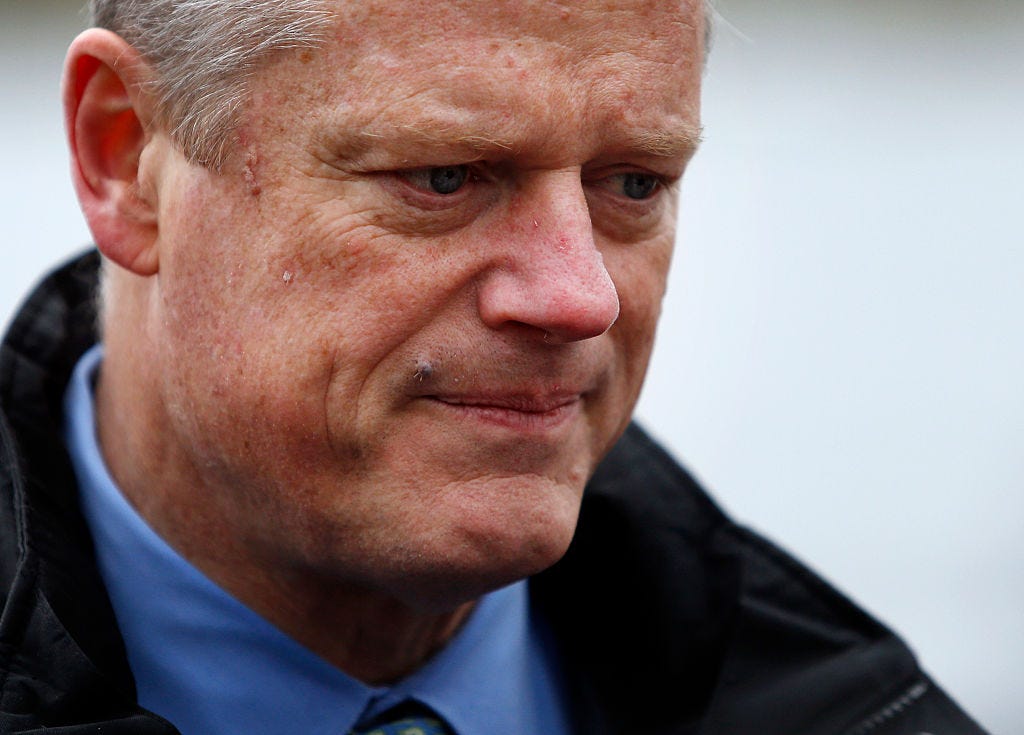Who Is Killing the Towns of Western Massachusetts?
Stories by Susan Crawford on Medium 2017-06-22
It may be the governor. In the State House. With the lobbyists.


This is the story of a dramatic failure of imagination and vision at the state level: Governor Charlie Baker’s apparent insistence that Massachusetts relegate small towns to second-rate, high-priced, monopoly-controlled (and unregulated) communications capacity. It’s a slow-rolling tragedy that will blight Western MA for generations. The likely outcome: Only those plucky, scrappy towns that elect to build on their own will escape the grip of unconstrained pricing for awful service.
The rest will fade into irrelevance.
Follow Backchannel: Facebook | Twitter
What new American generations will stay in a place that is essentially unconnected to the world? What new businesses and ways of making a living will emerge there? None and none.
Like a coroner doing advance work on an autopsy, let’s engage in some forensics. There’s a state agency in Massachusetts called MBI, or the Massachusetts Broadband Institute, charged with allocating $50 million in state bond funds to subsidize high-speed internet access connections to homes and businesses in rural areas of the Commonwealth. The towns have needed that access desperately for well over a decade.
That money has been hanging around since 2014, when the state legislature set it aside and asked the MBI bureaucracy to decide what to do with it. MBI determined that $40 million would go to 45 towns that had only dial-up or DSL services and $5 million would go to 9 additional towns that had some cable internet access service. (The remaining $5 million was apparently for overhead.)
For an agency that has produced virtually nothing so far, MBI is a high-priced operation. As far as I can tell, last year MBI spent $1 million of those state funds on consultants, lawyers, and administrative costs in order to hand $4 million to Comcast to provide its usual service to about a thousand homes in those nine Massachusetts towns that already had some cable service. What’s odd is that MBI told the public it chose Comcast because the company had vast experience and could get the work done without involving MBI—so it cost $1 million in oversight expenses to choose a company that doesn’t need oversight.
 (Boston Globe / Getty Images)
(Boston Globe / Getty Images)MBI likely chose Comcast because Governor Baker has been very firm in his view that all last-mile internet access connections should be provided by enormous private sector companies with no civic oversight. In the words of Peter Larkin, chairman of MBI’s board, it is a “mandate of the Baker-Polito Administration [that MBI] aggressively pursue private sector participation to build, own, and operate last mile networks.” (Karyn Polito is the state’s lieutenant governor.) MBI is scrambling to fulfill that “mandate” by “aggressively pursuing” major providers — likely Comcast and Charter, and perhaps others — to do much more work in Western MA.
That’s clear from a November 2016 Request for Proposals issued by MBI requiring successful bidders for as many as 40 of the remaining towns to have pulled in minimum annual revenues of $100 million in each of the last three years. Yes, MBI will support last-mile connectivity—but only if the company building it is really, really rich and will own as well as operate the resulting networks.
Not only that: the winners of this RFP won’t have any competition —remember, this $19.6 million RFP from MBI covers service to “40 unserved Towns” — and so will be able to charge whatever they want for bad service.
Yes, bad service. At a time when cities and towns all over America are installing gigabit symmetric fiber connections, allowing for productivity, creativity, and new businesses as well as consumption of entertainment, the winning bidders will be required to provide just 25 Mbps download speeds and 3 Mbps upload speeds—at whatever price they choose. They’ll also be allowed to cherry pick among the 40 towns, making it very difficult for future town leaders to carry out any kind of regional effort. Not exactly a visionary move.
That RFP’s deadline came and went last week, and we’re waiting to learn who responded. I am willing to bet that Comcast did. We should know more by January 23.

There’s an alternative vision that would allow Western MA communities to control their own destinies: subsidize towns that want to own their own infrastructure. (This could be done through the structure of a state-authorized Municipal Light Plant utility I’ve described in an earlier column.) Following this path, towns would have a private company subject to their control design, build, and operate connectivity to homes and businesses, either as a cooperative of towns or on their own. In fact, there have been multiple efforts to implement this vision—it just seems few of them can get money from a state determined to subsidize rich quasi-monopolists.
Petersham, MA, a quaint and beautiful spot in the westernmost portion of Worcester County, is ready to act on its own. A recent town meeting overwhelmingly approved moving ahead with a town-commissioned utility network.
Petersham has to do something. Right now, the only high-speed wired data service available is Verizon DSL, and Verizon is refusing to connect new customers in town. Petersham has a viable business plan and just needs $560,000 from the state to fund its network preparation costs. The town will have an option to buy back the fiber network from its chosen private builder/operator, Matrix, at a price that goes down each year the network is in operation.
In my earlier column, I described the cooperative approach, led by a group called Wired West. Based on what MBI has been up to with its RFP, Governor Baker is clearly even more allergic to this grassroots way of doing things than I thought he was last year.
Wired West has been working to assuage the governor’s concerns about public involvement in communications infrastructure. The group put out a Request for Information of its own last fall. Wired West is looking for vendors that would provide operational services for town-owned networks that are part of a regional cooperative.
The benefits this approach would have for towns are obvious. Towns would be able to keep control, keep revenues local, serve the public interest in serving everyone at reasonable costs, lower costs by buying in bulk, and ensure that citizens are provided with fiber connectivity rather than second-rate cable networks. Many of the towns involved in Wired West have already approved issuing bonds to support two thirds of the cost of moving ahead. Yet state money from MBI will be needed to actually get these networks built.
And here’s the tick-tock of a dramatic story climax: These two alternative visions will be presented to the public at about the same time. Wired West will reveal its contenders for a publicly controlled regional effort during a public event on January 28, just five days after MBI reveals the identities of the $100 million-in-annual-revenue vendors who wrote back in response to MBI’s “please be Comcast” RFP. What do you think will happen? Will Baker realize that by squelching locally controlled fiber efforts he’s relegating most of the Commonwealth to third-world status?
Although I’m eternally optimistic about the capacity of enlightened public servants to realize that public control of wholesale communications networks is essential —that it’s the only way we’ll see competition, affordable pricing, and world-class connectivity for every American — our giant incumbents are choosing to compete by lobbying state officials. That’s as true in Massachusetts as it is in the rest of the country.

This year, I’ll be traveling the US talking to people in scrappy communities who are building fiber on their own. They’re fed up with waiting for enormous incumbent communications companies to decide it’s in their corporate interests to invest in 21st-century communications capacity for Americans. These communities have run the numbers and looked at their economic development needs — as well as the possibilities for advanced healthcare, world-class educations, effective governance, energy management, and public safety that publicly controlled wholesale “street grids” of fiber make real — and they’ve come to the conclusion that if they hang back, they’ll become irrelevant.
These towns won’t be left behind in the future. Maybe the people in Western MA will move to some of those towns, where a rural lifestyle won’t mean giving up one’s livelihood and connection to the rest of the world.
Unfortunately, because of Governor Baker, many of the people of Western MA, especially younger residents, will have to move somewhere. And even a region rich in culture, with second-home owners who otherwise might want to stay full time, will find itself populated with ghosts. Unhappy ghosts, with lousy, overpriced internet access.
Let’s hope Charlie Baker can see his way around the lobbyists’ claims. Let’s hope he can change his approach and let the towns go ahead. Let’s hope that Baker doesn’t want Western MA to be irrelevant. Or dead.

Who Is Killing the Towns of Western Massachusetts? was originally published in Backchannel on Medium, where people are continuing the conversation by highlighting and responding to this story.